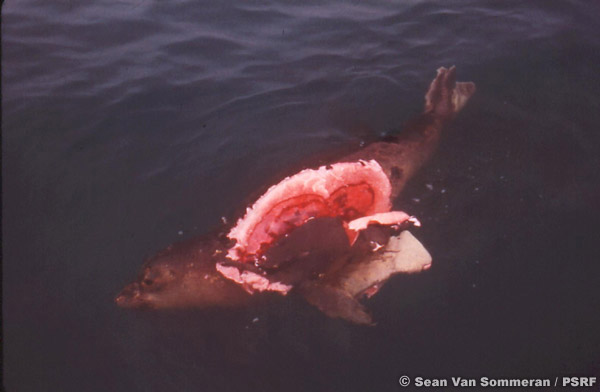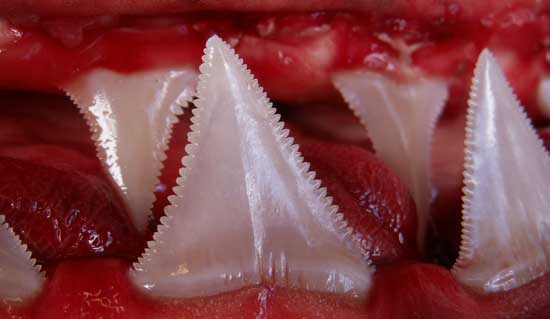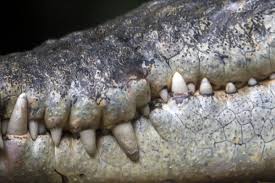|
|
Post by DinosaurMichael on Jun 1, 2013 5:55:59 GMT 5
Do you honestly think it's more effective? Look at this.  As you were saying? And also look at the Shark's teeth.  Now look at the Crocodile's teeth.  They're more blunt. And as I said. Great White Sharks have crippled Bull Elephant Seals, which are far bigger than Saltwater Crocodiles with one single bite. So chances are it would cripple the Crocodile too. Would you ratherbe hit upside the head by a sledgehammer swinging at 5,000lbs or a chainsaw? GUSTAVE WOULD LITERALY CRUSH A AVERAGE SHARKS HEAD LIKE A POTATO CHIP! Exactly my point. Slicing just "looks" like it does more damage. Me shattering every bone in your wouldn't look as gross, but it would get the job done. Did I mention getting something crushed hurts far worse? Well if what your saying is true. I rather be hit by a chainsaw. You've proved my point though. I've changed my opinion about the fight between parity. I think it's 50/50 now. |
|
|
|
Post by Runic on Jun 1, 2013 5:59:37 GMT 5
How have I proved your point? A bite from a crocodile can do just as much damage as one from a shark. I'd like to see a great white crush a tortoise shell like a cookie.
|
|
|
|
Post by DinosaurMichael on Jun 1, 2013 6:07:23 GMT 5
How have I proved your point? A bite from a crocodile can do just as much damage as one from a shark. I'd like to see a great white crush a tortoise shell like a cookie. You proved it by showing me Crocodile's bites can be as deadly as a Great White Sharks. Also I heard that despite having a very low bite force. Tiger Sharks can crush through Sea Turtle shells like marshmallows. If a Tiger Shark can do it. I don't see why a Great White could too. |
|
|
|
Post by Runic on Jun 1, 2013 7:14:08 GMT 5
How have I proved your point? A bite from a crocodile can do just as much damage as one from a shark. I'd like to see a great white crush a tortoise shell like a cookie. You proved it by showing me Crocodile's bites can be as deadly as a Great White Sharks. Also I heard that despite having a very low bite force. Tiger Sharks can crush through Sea Turtle shells like marshmallows. If a Tiger Shark can do it. I don't see why a Great White could too. Tiger shark don't crush through them. Their jaws allow them to saw through the shell. Crocodile just crush it like a potato chip. |
|
|
|
Post by DinosaurMichael on Jun 1, 2013 7:29:21 GMT 5
You proved it by showing me Crocodile's bites can be as deadly as a Great White Sharks. Also I heard that despite having a very low bite force. Tiger Sharks can crush through Sea Turtle shells like marshmallows. If a Tiger Shark can do it. I don't see why a Great White could too. Tiger shark don't crush through them. Their jaws allow them to saw through the shell. Crocodile just crush it like a potato chip. Oh. I always kept thinking they were not only slicing through, but crushing as well. I guess not. |
|
Fragillimus335
Member
   Sauropod fanatic, and dinosaur specialist
Sauropod fanatic, and dinosaur specialist
Posts: 573
|
Post by Fragillimus335 on Jun 1, 2013 9:12:32 GMT 5
Lolong is estimated to have a bite force of ~7290lbs of force... that's up in Tyrannosaurus territory. :0 Scary stuff.
|
|
|
|
Post by coherentsheaf on Jun 1, 2013 12:55:43 GMT 5
Lolong is estimated to have a bite force of ~7290lbs of force... that's up in Tyrannosaurus territory. :0 Scary stuff. The newest paper estimating Tyrannosaurus bite force underestimated croc bite force. Similarly McHenry's PHD thesis predits a bite frce similar t or slightly higher than a crocodile's bite force at similar weight for Sue. The popularly cited numbers for Tyrannosaurus are underestimates, most likely by a factr of about 2-3. |
|
|
|
Post by theropod on Jun 1, 2013 14:36:47 GMT 5
Those two bite mechanisms are different in function. Of course the jaws of the shark are more efficient, and at the same power applied more effective too. That's why the croc relies on greater power. The bite force of a large GWS is estimated at 1,8t, that of a large croc at above 3t. Of course the shark doesn't even primarily rely on its bite force, since it would only cause a number of puncture wounds. The true damage is done by lateral shaking. In the croc, it is done by emplyong a deathroll, since its robust conical teeth are not built to go deep and break stuff (of course a bite would still break bone, no question) but to grip. Anyone else annoyed when watching a documentary and hearing "the crocodile has razor-sharp teeth..." or "the shark has an incredibly powerful bite and crushes its victims..."? coherentsheaf: Do you mean Bates & Falkingham, 2012 (57000N)? I had once asked a question about the bite force of Allosaurus (8000N, same study) on Askabiologist, and Falkingham replied saying it was "unlikely the muscles would have activated the way we made them" and that would probably have produced an overestimate. Doe that only refer to Allosaurus? |
|
|
|
Post by coherentsheaf on Jun 1, 2013 17:50:30 GMT 5
Those two bite mechanisms are different in function. Of course the jaws of the shark are more efficient, and at the same power applied more effective too. That's why the croc relies on greater power. The bite force of a large GWS is estimated at 1,8t, that of a large croc at above 3t. Of course the shark doesn't even primarily rely on its bite force, since it would only cause a number of puncture wounds. The true damage is done by lateral shaking. In the croc, it is done by emplyong a deathroll, since its robust conical teeth are not built to go deep and break stuff (of course a bite would still break bone, no question) but to grip. Anyone else annoyed when watching a documentary and hearing "the crocodile has razor-sharp teeth..." or "the shark has an incredibly powerful bite and crushes its victims..."? coherentsheaf: Do you mean Bates & Falkingham, 2012 (57000N)? I had once asked a question about the bite force of Allosaurus (8000N, same study) on Askabiologist, and Falkingham replied saying it was "unlikely the muscles would have activated the way we made them" and that would probably have produced an overestimate. Doe that only refer to Allosaurus? Yes I mean the 2012 study. They claim i their paper that they correctly predicted croc sustaind forces, but they did not. McHenry's estimate also puts T-rex at the same force adusted for mass like a crocodile. I think Sue would have had a posterior bite force in excess of 100 000N. I cannot comment on Allosaurus. |
|
|
|
Post by Runic on Jun 1, 2013 18:39:16 GMT 5
theropod
The jaws of a shark being more effective than a crocs if equal force is applied is void. A shark biting a the force of a crocodile be it an average black caiman or gustave and lolong would smash its jaws in and break all its teeth.
|
|
|
|
Post by theropod on Jun 2, 2013 1:27:05 GMT 5
That's why they don't apply such large forces, they don't need them and couldn't even endure them. If you apply the bite force of a shark, a croc's jaws would be ineffective compared to the shark's.
Shark's teeth aren't THAT fragile either. They smash into their prey while ram-feeding and violently shake it.
|
|
|
|
Post by Grey on Jun 2, 2013 6:50:09 GMT 5
Theropod is right, predatory sharks teeth are particularly durable (this durability being sometimes exagerrated) but also very resistant to teeth diseases. However, I think that a monster would still be a challenge to something even like Schatzi, even if I think that the sheer size (I assume that Schatzi certainly exceeds 2 tons, perhaps approaching the 3 tons mark ?) gives the highest chances to the shark here. It depends of the conditions. I doubt though that one single bite from Gustave or Lo Long to the skull of the shark would be very likely to happen, and very likely to be effective. The head of a large great white is very big and deep, that's not a buffalo head.  Another factor : large sharks are very endurant and tolerant to long efforts. Life once had linked about a whale shark only subdued after having been harpooned and even shot a great number of times and an hammerhead shark which had dragged a small fisherboat on a very long distance (11 or 12 kilometers if I remember right). On the other hand, crocs are very tolerant to pain (just like sharks) and extremely powerful but only for short time before the lactic acid quickly tires their muscles. That's also a potential advantage toward a large great white... |
|
|
|
Post by Runic on Jun 2, 2013 7:02:06 GMT 5
That's why they don't apply such large forces, they don't need them and couldn't even endure them. If you apply the bite force of a shark, a croc's jaws would be ineffective compared to the shark's. Shark's teeth aren't THAT fragile either. They smash into their prey while ram-feeding and violently shake it. Crocs have been known to shatter their teeth just by closing their jaws. So yea a shark too is a toothpick compared to a crocodile. Grey DM said he would favor an AVERAGE shark over gustave or lolong. However a question. If shatzi(can't spell the name lol) were to deliberately let gustave or lolong bite full force on her nose. Since shark lack bones you don't thinkbthe monster crocs would turn her head into a crushed potato chip? |
|
|
|
Post by Grey on Jun 2, 2013 7:08:55 GMT 5
As I know, the cartilaginous skeleton in large sharks display more flexibility and a comparable robustness. They are also very resistant to shocks. But bony or not, there would be...big damages. But not crushed like this. But I question the ability (the realism) of even a large croc to have a good grip on the head or cranial region of such a large great white. I would more fear for the shark's fins and ability to swim efficiently after a bite and death roll in this area, than for the head region of the shark. Also, Runic, given the structure of a shark mouth, I doubt any shark could break its teeth even if it wanted to do so. |
|
|
|
Post by DinosaurMichael on Jun 2, 2013 7:19:27 GMT 5
Black Ice: An average Great White Shark weighs as much as those monster Crocodiles like Gustave and Lolong. On average. Great White Sharks weighs 2,000 lbs. I did also say I now think at parity. It's 50/50 since you proved to me that Crocodile bites can be as deadly as a Great White Shark's bite.
|
|